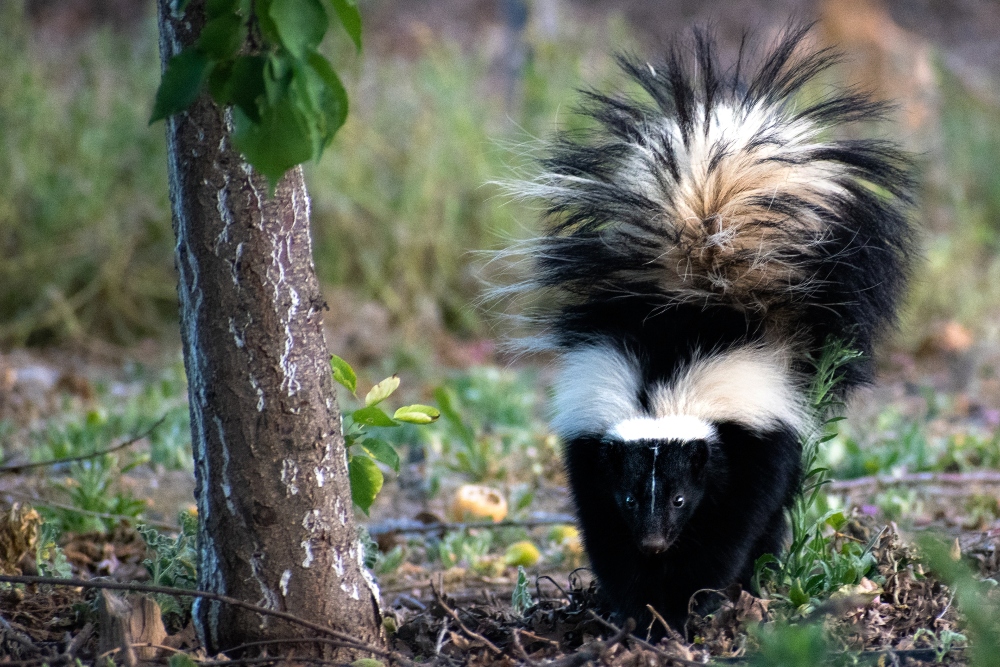
In spite of their small size, skunks are largely unchallenged in the animal kingdom, thanks largely to their overpowering stink. Under the threat of spraying them, skunks are able to force animals twice their size to back off, and leave them be. Which is no small task, particularly for such a lithe creature. Yet while most of us know skunks by their black and white pattern and their pungent scent, there are lots of things we get wrong about the small mammal. Today, we look at some of the common skunk misconceptions that may be shaping how you deal with a skunk infestation.
Tip: If you're experiencing a skunk infestation on your property, chances are a professional wildlife company can help you get rid of the animal speedily, and efficiently. Because of the extremely pungent and persistent nature of skunk spray, it's inadvisable to attempt to remove one yourself.
Skunks are Mean
Driven, no doubt, by the pungent, deeply unpleasant smell, we tend to associate skunks with a vicious, mean streak. In actual fact, that couldn't be further from the truth. What you need to understand about skunks is while they do have this potent weapon in their arsenal, they're unlikely to use it without discernment. In other words, if a skunk thinks it can get out of an altercation without spraying its opponent, it will. This also means that if you leave a skunk alone, it's likely to do the same for you. And that's because once emptied, a skunk's natural spray reserve takes tays to refill, during which time the skunk is left defenseless in the face of real danger. So if you thought skunks go around spraying people and property willy-nilly, the truth is, they don't. In any case, they're not spraying you because they're mean, but because they're protecting themselves and their young.
A Skunk Outside in the Daytime is Rabid
While that's a distinct possibility (and shouldn't be taken lightly), not all skunks seen outside during the day are rabid. This is true about other common nuisance wildlife like raccoons or opossums. Though typically nocturnal (since the dark makes foraging easier), skunks can go out of their den during the day, in search of food or water. Typically, they'll do this if they are caring for a young litter, and don't have enough resources. Alternatively, they may be pushed outside during the daytime, if they were being harassed by a predator at night, who wouldn't let them go out to scavenge when they normally would. Still, there is the possibility that a skunk outside in the daytime is rabid. Look for signs of lethargy or erratic behavior, and do not approach it, for your own safety.
You Get Rid of the Stench with Tomato Juice
This one's really disappointing, because it's nice to think there's an easy, on-hand cure for the nauseating skunk stench. The idea there is based on the composition of skunk spray, which is highly acidic. (Skunk spray has a high sulfur content, which also accounts for that burning sensation when you get sprayed in the eyes, or inhale the spray). While tomato juice may alleviate the stench a little, it doesn't actually get skunk stink out. What does get skunk stink off is detergent, and other household cleaning items.
Spraying in the Eyes Will Make You Blind
Some people mistakenly think that getting sprayed in the eyes will cause them to go blind. Obviously, if you get sprayed by a skunk, you should immediately wash the sprayed area long and thoroughly. However, skunk spray, even directly in the eye, only causes that burning sensation because of the sulfur. It may result in eye irritation, but it won't make you lose your sight. Similarly getting sprayed in the eyes isn't fatal. While there have been one or two extremely rare instances of skunk-related death, those resulted from the stress, rather than the spray itself. Lastly, skunk spray, even in the eyes, nose or mouth, can not infect you with rabies. Only saliva in a direct wound (e.g. biting) can do that.
EDITORIAL POLICY
Editorial Policy: The Flash List is dedicated to providing trustworthy editorial content by maintaining strict ethical standards, journalistic integrity, and credible professionalism regardless of any remuneration as working media. The Flash List is not affiliated with third-party companies mentioned and makes no endorsement or guarantee expressed or implied. The preceding article is intended for informational reference only, and does not constitute advice of any kind. Moreover, a qualified professional should be consulted regarding any lifestyle consideration, medical treatment, or monetary transaction, etc. Content contains affiliated link(s) for which compensation was received in accordance with USFTC regulations and terms and conditions.
MORE ON THE FLASH LIST
































